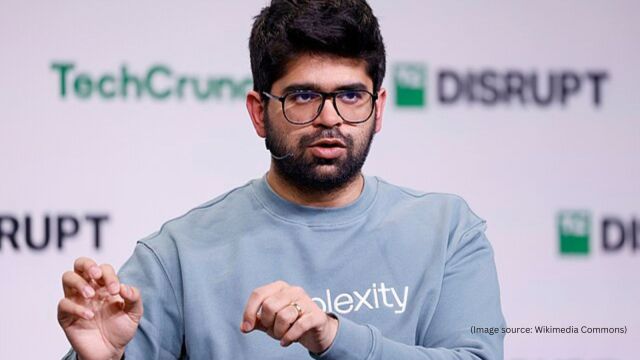Is Perplexity most at risk if AI bubble pops? Here’s why a Silicon Valley crowd thinks so
The AI search startup led a list of companies most likely to fall amid the AI boom that many investors and stakeholders fear could be turning into a bubble.
 Aravind Srinivas graduated in 2017 with dual degrees in Electrical Engineering (Image source: Wikimedia Commons)
Aravind Srinivas graduated in 2017 with dual degrees in Electrical Engineering (Image source: Wikimedia Commons)When you think about the AI startup that is most likely to go bust, what is the first name that comes to mind? For attendees of a recent Silicon Valley conference, the answer was Perplexity.
The AI search startup led the list of companies most likely to fall amid the AI boom that many investors and stakeholders fear could be turning into a bubble. More surprisingly, OpenAI occupied the second position on a list compiled based on an informal survey conducted among attendees of the Cerebral Valley AI Summit in San Francisco, California, United States, last week.
 The one-day founder-investor conference saw panels featuring executives from AI heavyweights such as Anthropic and xAI. As part of the survey conducted by organiser and independent journalist Eric Newcomer, more than 300 attendees at the conference were asked: Which billion-dollar AI startup would you bet against?
The one-day founder-investor conference saw panels featuring executives from AI heavyweights such as Anthropic and xAI. As part of the survey conducted by organiser and independent journalist Eric Newcomer, more than 300 attendees at the conference were asked: Which billion-dollar AI startup would you bet against?
This comes at a moment when many observers are scanning the market for signs of an AI bubble and trying to guess which major player might be the first to stumble. Earlier this month, Softbank said it had sold its $5.8 billion stake in Nvidia, considered to be a clear winner of the AI boom, a move which stirred fresh concerns about inflated valuations.
Several critics have pointed out that the stock prices of tech giants have soared too high and too fast amid the AI mania, drawing comparisons to the 2000 dot-com bubble that ultimately burst.
Perplexity is one such startup that has raised back-to-back funding rounds, with valuations reaching $50 billion, according to Business Insider. In response to the survey at the Cerebral Valley Summit, Perplexity spokesman Jesse Dwyer was quoted as saying, “Geeze, it sounds more like the judgmental valley conference.”
OpenAI’s position as the second-largest AI startup to bet against is also due to its ballooning valuation, even as the ChatGPT-maker plans to spend trillions of dollars to build out data centres and AI infrastructure.
To be sure, both Perplexity and OpenAI also appeared in another survey conducted at the event, which asked respondents which AI company they would bet on. Claude-maker Anthropic, which recently closed a new funding round at a $350 billion valuation, led that list.
Previously, OpenAI CEO Sam Altman said that he believes the AI market is real, but he also pointed out that it may still bring benefits. “When bubbles happen, smart people get overexcited about a kernel of truth,” Altman was quoted as saying by The Verge.
“Are we in a phase where investors as a whole are overexcited about AI? My opinion is yes. Is AI the most important thing to happen in a very long time? My opinion is also yes,” he added.
However, Altman has strongly refuted that his company’s valuation is inflated. When asked about OpenAI’s plans to pay for its massive spending commitments during a recent podcast appearance, Altman responded with some pushback.
“I just — enough. I think there are a lot of people who would love to buy OpenAI shares,” he said to Brad Gerstner, whose firm, Altimeter Capital, is an OpenAI investor.







